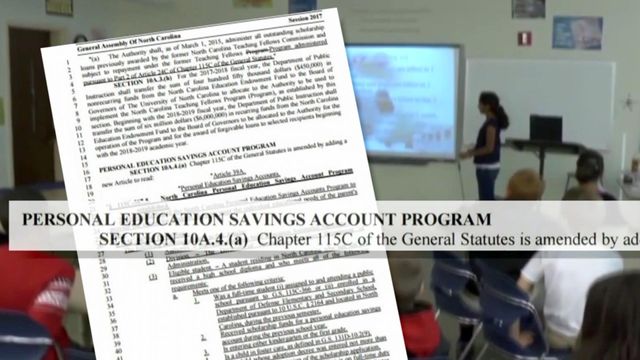Senate budget includes debit card program for school costs
North Carolina pays millions of dollars each year so students from low-income families and children with disabilities can attend private schools, but a provision tucked into the Senate budget would go beyond tuition vouchers to provide debit cards to parents to pay for school costs.
Posted — UpdatedThe Personal Educational Savings Account, or PESA, is geared toward students with disabilities. Their parents would get a prepaid debit card with up to $9,000 a year on it, and they could use the tax-free money to pay for everything from tuition and books to tutoring and school transportation costs.
Winner described the plan as a "voucher program on steroids" and said that other states with similar programs have had problems with debit card accountability.
"In Arizona, we have seen parents buy big-screen TVs. There was one who was investigated for using the money to pay for an abortion," she said.
Bob Luebke, senior policy analyst for the conservative Civitas Institute, said PESA is the next logical step for school vouchers in North Carolina, building upon the 3-year-old Opportunity Scholarships program.
"Parents know best the educational needs of their child," Luebke said. "I think the paramount concern is matching the child to the school that best fits their educational needs, and that's what ESAs do for parents."
As for accountability, he said the state will have ways to ensure the money is used for allowable educational expenses.
The Senate budget sets aside $450,000 to start the program in the coming school year, growing to $1 million in 2018-19. Both sides of the debate predict the PESA program will grow as it has in Arizona, Florida, Tennessee, Mississippi and Nevada.
The budget also calls for a massive expansion of the Opportunity Scholarships program, which now sets aside about $35 million for vouchers of up to $4,200 a year per student. Under the Senate proposal, $10 million would be added to the program each year for the next decade.
Lawmakers suggested a similar voucher expansion last year, but it didn't make it into the final budget.
Winner said too much state money that could be flowing to public schools is going elsewhere with little scrutiny.
"The responsibility is ultimately back to the taxpayers that we're getting our money's worth," she said.
"Parents pay taxes, and the money should go to where the child wants to go to school," Luebke countered.
Related Topics
• Credits
Copyright 2024 by Capitol Broadcasting Company. All rights reserved. This material may not be published, broadcast, rewritten or redistributed.





